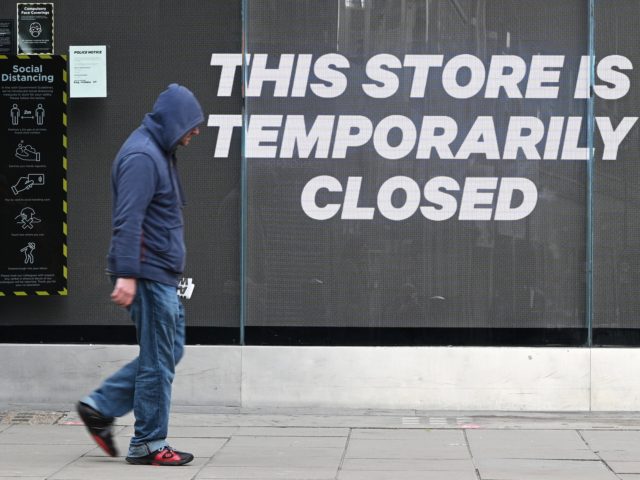The Chinese coronavirus pandemic and the ensuing national lockdown measures have cost the British economy some £251 billion over the past year, a report has found.
A study conducted by the Centre for Economics and Business Research (CEBR) found that the coronavirus lockdowns cost the British economy nearly twice the economic output of Scotland or the entire south-east of England.
The study said that the United Kingdom’s Gross Value Added (GVA) — a measurement that compares the total value of goods produced versus the cost of materials and labour — was £251 billion less than would have been expected without the pandemic and economic shutdowns.
“Consumer footfall has plummeted, businesses are still shut, and many individuals have found themselves out of work. Further bouts of area-specific restrictions have added some regional variation to economic fortunes, a matter made all the more pertinent given the Government’s promises to ‘level up’,” the report said.
“These factors, amongst countless others, have entailed a huge cost to the UK economy, in addition to the devastating cost of thousands of lost lives,” it added.
The CEBR report noted that the economic devastation was comparatively worse in areas such as the West Midlands, East Midlands, and the East of England than in London. The report pointed to additional regional restrictions in cities such as Birmingham, Leicester, and Luton as contributors to the disparity.
London saw a less than 5 per cent lower contribution to the economic downturn compared to its typical share of the British economy. The report said that this may be in part due to the relative ease with which the financial and insurance sectors were able to shift to remote working.
“Despite [the] anticipated recovery, some regions may be more subject to lingering effects from the pandemic, such as higher rates of joblessness and a greater degree of business closures,” the CEBR noted.
“If the government is truly committed to addressing regional imbalance, it will not allow these areas to disproportionately bear the weight of the losses brought on by the pandemic. To do otherwise would risk further divergence in fortunes.”
This week, the Office for National Statistics (ONS) also revealed that the number of people on payroll has fallen by 693,000 since February of last year.
Young people have been the hardest hit economically by the lockdown measures, with people under the age of 25 representing 60 per cent of all jobs lost since the start of the pandemic.
At present, a quarter of all businesses remain shuttered in the United Kingdom, with the government borrowing approximately £1 billion per day to keep employee furlough and business support schemes afloat.
The head of lifestyle economics at the Institute of Economic Affairs (IEA), Christopher Snowdon, warned that the government’s continued lockdown restrictions will continue to damage the economy, saying: “By promising to ease the lockdown on the basis of ‘data not dates’ and then insisting that the dates cannot be brought forward, Boris Johnson has created a one-way ratchet that will become unsustainable as the weeks drag on.”
“Every extra day of lockdown produces diminishing returns at exponential cost. We should not be tied to obsolete models. If the situation continues to improve between now and Easter, there will be a strong case for bringing the roadmap forward by four weeks,” he added.
Follow Kurt Zindulka on Twitter here @KurtZindulka

COMMENTS
Please let us know if you're having issues with commenting.